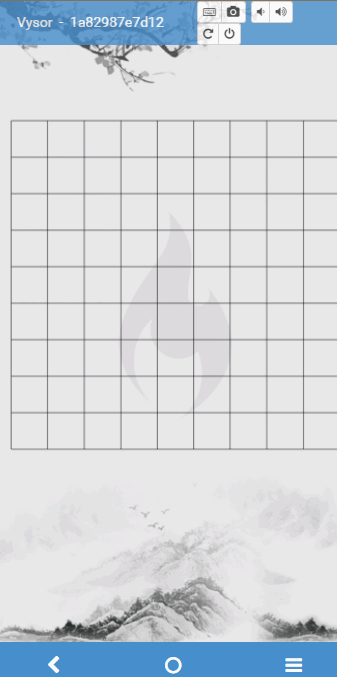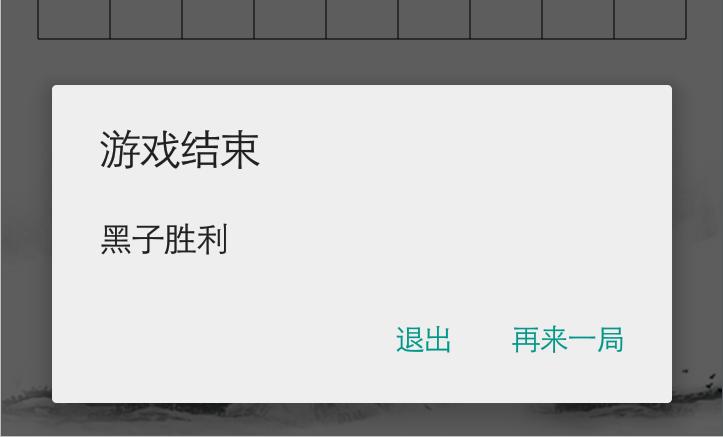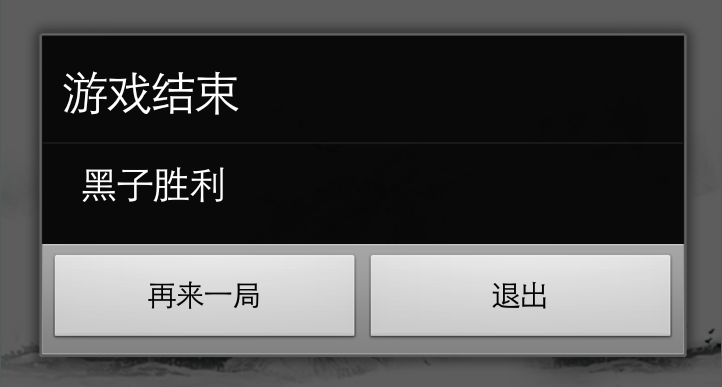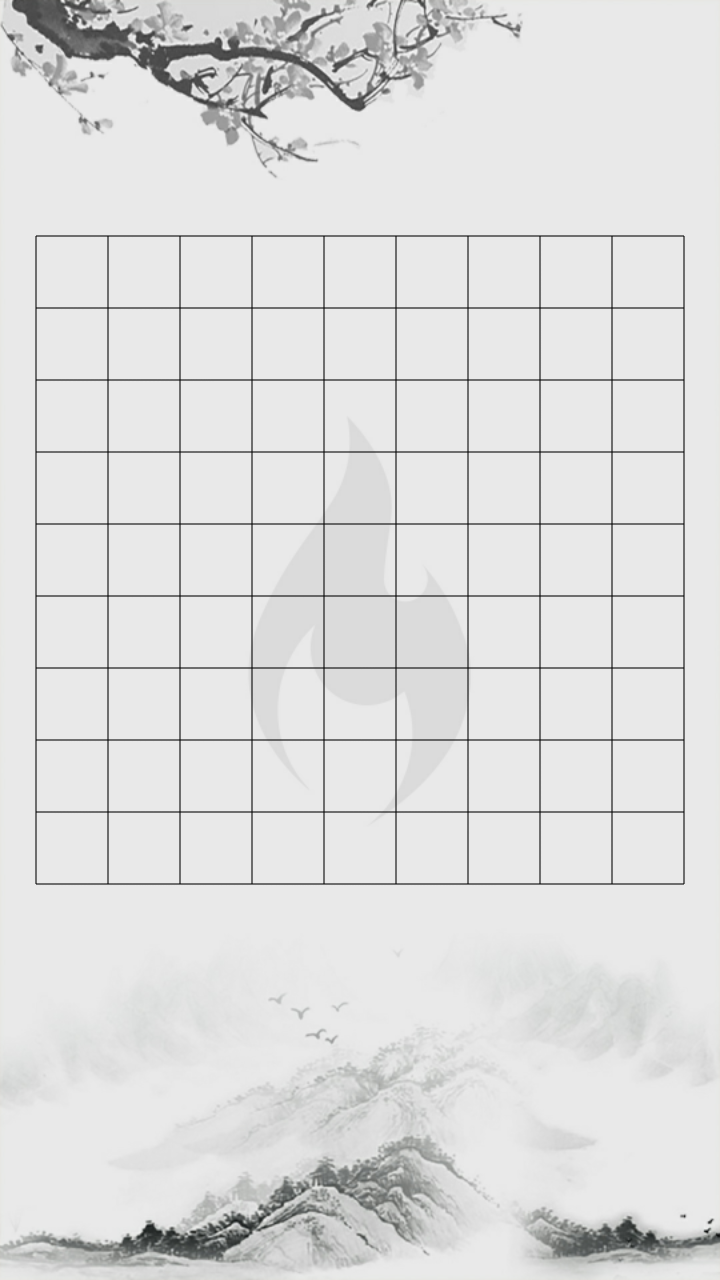400行代码实现双人对战五子棋(适合新手入门)
跟上一篇博客一样,都是看了慕课网的视频之后写的学习记录,记录一下实现的思路,大部分内容比较简单,但也从中学到了很多东西.
按惯例首先看一下效果:(素材都是用的慕课网给的)
顺便也贴一下这个视频的连接,也推荐新手多上慕课看视频,能学到很多东西,质量也很好:Android-五子连珠
下面就一步步来实现吧
一:首先看到的是全屏的Activity,没有状态栏,在Android中要实现全屏我知道的有两种方式,推荐第二种因为第一种存在问题,下面就一一介绍一下:
1.第一种全屏方式:Manifest中设置要全屏的Activity的主题为@android:style/Theme.NoTitleBar.Fullscreen,同时需要更改Activity继承的父类为Activity,否则无法启动,如下:
<application
android:allowBackup="true"
android:icon="@mipmap/ic_launcher"
android:label="@string/app_name"
android:supportsRtl="true"
android:theme="@style/AppTheme">
<activity
android:name=".MainActivity"
android:label="@string/app_name"
android:theme="@android:style/Theme.NoTitleBar.Fullscreen">
<intent-filter>
<action android:name="android.intent.action.MAIN" />
<category android:name="android.intent.category.LAUNCHER" />
</intent-filter>
</activity>
</application>Activity
public class MainActivity extends Activity { ...缺点:正是因为这种方法更改了Activity的主题和所继承的父类,相应的会引起其他很多问题,如下:
1.修改了Activity主题,会使得在此Activity内显示的组件在4.0+设备和5.0+设备下使用同样的资源文件,如下图:
在5.1版本的设备上进行测试,本应该显示的Dialog是这样的:
结果设置了上文的主题之后却是这样的:
2.第二种问题相对于第一种就显得不是那么明显,由于这种全屏方式更换了当前Activity的父类,且默认生成的父类应该是AppCompatActivity,更换之后如果之前使用的FragmentManager对象,那么原本的获取方式是getSupportFragmentManager(),换成Activity之后就只有getFragmentManager(),目前遇到的问题只是这样.
2.第二种全屏方式:获取Activity的Window对象,添加全屏的flag,如下:
Window window = getWindow();
window.addFlags(WindowManager.LayoutParams.FLAG_FULLSCREEN);两种方式的效果是一样的,都是示例图中的全屏状态,第二种更为方便,简单,推荐第二种.
二.主要的布局只有一个自定义的棋盘Panel组件,父组件是RelativeLayout,有一个背景图,布局文件如下:
<?xml version="1.0" encoding="utf-8"?>
<LinearLayout xmlns:android="http://schemas.android.com/apk/res/android"
android:layout_width="match_parent"
android:layout_height="match_parent"
android:background="@drawable/bg">
<com.brioal.gobang.view.Panel
android:id="@+id/main_panel"
android:layout_width="match_parent"
android:layout_height="match_parent"
android:layout_gravity="center"
android:layout_marginBottom="40dp" />
</LinearLayout>
由于游戏结束之后设置显示的Dialog不想遮挡最后的棋盘,所以将棋盘设置了一个layout_marginBottom使棋盘整体向上移动了40dp
自定义的Panel封装了棋盘线的绘制,棋盘点击事件的处理,棋子的绘制,棋子点的存储,胜负情况的判断等,给外部的接口只是游戏的结果和重新开始游戏的方法.
三.自定义棋盘的代码书写.
1创建Panelclass文件,继承View,并添加两个构造方法,只需要处理两个参数的构造方法,单个参数的是在代码中创建View时候调用的,两个参数的是在布局文件中定义时候调用的,如下:
public class Panel extends View {
public Panel(Context context) {
this(context, null);
}
public Panel(Context context, AttributeSet attrs) {
super(context, attrs);
}
}2.接下来定义一下需要用到的参数,由于要绘制棋盘的线条,棋子,等,所以需要定义的参数如下:
private int MAX_LINE = 10; // 格子的数量
private int MAX_IN_LINE = 5; //胜利的条件
public static int WHITE_WIN = 0; //白子胜利的标志
public static int BLACK_WIN = 1; // 黑子胜利的标志
private int panleWidth; // 棋盘的宽度
private float lineHeight; // 方格的高度
private Paint mPaint; // 用于绘制线的画笔
private Paint mPaint_point; // 用于绘制点的画笔
private Bitmap mWhite; // 白色棋子
private Bitmap mBlack;//黑色棋子
private int pieceWidth; // 棋子要显示的高度
private int offset; // 棋盘离组件边界的偏移
private List<Point> mWhites; // 存储棋盘上的白子
private List<Point> mBlacks; // 存储棋盘上的黑子
private boolean isWhite = false; // 存储是否是白子 , 默认黑子先行
private boolean isGameOver = false; // 存储游戏是否已经结束
private onGameListener onGameListener; // 供外部调用的接口参数
private int mUnder; // 组件的底部的位置 , 用于确定Dialog的显示位置
public interface onGameListener { // 用于回调的接口
void onGameOVer(int i);
}3.下一步是获取棋盘的尺寸,棋盘是正方形的,并且是以棋盘的宽度为准的,一般尺寸的获取是在onSizeChanged里面获取的,这个方法会在进行绘制之前调用,且只调用一次,并且会在屏幕尺寸发生改变的时候调用,如屏幕旋转,对尺寸参数进行处理的代码如下:
@Override
protected void onSizeChanged(int w, int h, int oldw, int oldh) {
super.onSizeChanged(w, h, oldw, oldh);
panleWidth = w; // 获取棋盘的宽度
mUnder = h - (h - panleWidth) / 2;
lineHeight = panleWidth * 1.0f / MAX_LINE; // 获取格子的高度 10行,则直线有10条 ,格子只有9个
offset = (int) (lineHeight / 2);
pieceWidth = (int) (lineHeight * 3 / 4); // 棋子的高度为格子高度的3/4
mWhite = Bitmap.createScaledBitmap(mWhite, pieceWidth, pieceWidth, false); // 根据棋子宽度进行缩放
mBlack = Bitmap.createScaledBitmap(mBlack, pieceWidth, pieceWidth, false); //根据棋子宽度进行缩放
}4.尺寸处理完之后就需要绘制棋盘了,看示例图可以直到,棋盘线距离组件的边界都有一个偏移量,并且已经在onSizeChanged内处理过了,绘制棋盘很简单,就是一个循环就能完成全部的绘制工作.
绘制之前需要先初始化画笔,这里我们就将绘制线和绘制棋子的画笔都初始化一下,细节都在注释里面:
mPaint = new Paint();
mPaint.setColor(0x88000000); // 设置画笔的颜色
mPaint.setAntiAlias(true); // 画笔设置抗锯齿
mPaint.setDither(true); // 画笔设置图像抖动处理,使图像更加平滑
mPaint.setStyle(Paint.Style.STROKE); // 设置绘制方式
mPaint.setStrokeWidth(2); // 设置画笔的边界宽度
mPaint_point = new Paint();
mPaint.setAntiAlias(true);
mPaint.setDither(true);
mWhite = BitmapFactory.decodeResource(getResources(), R.drawable.stone_w2); // 获取白棋的资源文件
mBlack = BitmapFactory.decodeResource(getResources(), R.drawable.stone_b1); // 获取黑棋的资源文件
mWhites = new ArrayList<>();
mBlacks = new ArrayList<>();接下来绘制棋盘,观察棋盘可以知道,横线的起点为偏移量,终点为宽度减去偏移量,起始Y坐标与终止Y坐标相同,都为行高与当前序号的乘积,竖线绘制的参数与横线的参数完全相同,不同的只是与横线的x,y刚好相反,代码如下:
//绘制棋盘
private void drawBoard(Canvas canvas) {
int start_x = offset; // 起始 x坐标
int end_x = panleWidth - offset; // 终止x坐标
for (int i = 0; i < MAX_LINE; i++) {
float start_y = i * lineHeight + offset; // 起始的y坐标
float end_y = i * lineHeight + offset; // 终止的y坐标
canvas.drawLine(start_x, start_y, end_x, end_y, mPaint); // 绘制横向的
canvas.drawLine(start_y, start_x, end_y, end_x, mPaint); // 纵向只需要把 横向的xy交换就行
}
}然后在onDraw内调用drawBoard即完成了棋盘的绘制,效果如下:
5.我们之前处理了白子黑子的资源文件,接下来应该处理点击事件,并且将棋子显示到棋盘上
首先我们使用List<Point>来存储棋子的位置,Point类为系统自带,在onTouch方法中对点击的位置进行计算,生成横纵坐标是棋子在棋盘中的相对位置的Point,然后添加到对应的List<Point>中去,代码如下,详细的都在注释当中:
@Override
public boolean onTouchEvent(MotionEvent event) {
if (isGameOver) {
return false;
}
int action = event.getAction();
if (action == MotionEvent.ACTION_DOWN) {
Point point = new Point((int) ((event.getX() - offset) / lineHeight), (int) ((event.getY() - offset) / lineHeight));
if (!mWhites.contains(point) && !mBlacks.contains(point)) { // 如果没有点
if (isWhite) {
mWhites.add(point); // 存入白子
isWhite = false;
} else {
mBlacks.add(point); //存入黑子
isWhite = true;
}
}
invalidate();
return true;
}
return super.onTouchEvent(event);
}获取到了要显示的点,接下来就是遍历List,将点绘制到画布当中去,如下:
//绘制棋子
private void drawPoints(Canvas canvas) {
for (Point point : mWhites) {
canvas.drawBitmap(mWhite, offset + point.x * lineHeight - pieceWidth / 2, offset + point.y * lineHeight - pieceWidth / 2, mPaint_point);
}
for (Point point : mBlacks) {
canvas.drawBitmap(mBlack, offset + point.x * lineHeight - pieceWidth / 2, offset + point.y * lineHeight - pieceWidth / 2, mPaint_point);
}
}6.能通过点击交替生成棋子之后需要的就是对游戏结束条件的判断,同时调用接口将结果传出,判断胜利比较麻烦,基本原理是对白子和黑子中的每一个点进行四个方向上的判断,判断是否连成5个或者是连成4个且至少存在两个空白位置,代码如下:
//判断是否游戏结束,在onDraw方法内调用
public void checkGameOver() {
boolean whiteWin = checkFiveInLine(mWhites);
boolean blackWin = checkFiveInLine(mBlacks);
if (whiteWin || blackWin) {
isGameOver = true;
if (onGameListener != null) {
onGameListener.onGameOVer(whiteWin ? WHITE_WIN : BLACK_WIN);
}
}
}
private boolean checkFiveInLine(List<Point> points) {
for (Point point : points) {
int x = point.x;
int y = point.y;
//水平方向的检查
boolean isWin1 = checkHorizontal(x, y, points);
//检查垂直方向
boolean isWin2 = checkVertical(x, y, points);
//左斜方向的检查
boolean isWin3 = checkDiagonalLeft(x, y, points);
//右斜方向的检查
boolean isWin4 = checkDiagonalRight(x, y, points);
//任意方向五子连珠 , 游戏结束
if (isWin1 || isWin2 || isWin3 || isWin4) {
return true;
}
}
return false;
}
private boolean checkDiagonalRight(int x, int y, List<Point> points) {
int count = 1;
int emptyCount = 0;
//往右上方向的判断
for (int i = 1; i < MAX_IN_LINE; i++) {
Point point = new Point(x + i, y - i);
if (points.contains(point)) {
count++;
} else {
if (!mWhites.contains(point) && !mBlacks.contains(point)) {
emptyCount++;
}
break;
}
}
if ((count == MAX_IN_LINE - 1 && emptyCount > 0) || count == MAX_IN_LINE) {
return true;
}
//往左下方向的判断
for (int i = 1; i < MAX_IN_LINE; i++) {
Point point = new Point(x - i, y + i);
if (points.contains(point)) {
count++;
} else {
if (!mWhites.contains(point) && !mBlacks.contains(point)) {
emptyCount++;
}
break;
}
}
if ((count == MAX_IN_LINE - 1 && emptyCount > 0) || count == MAX_IN_LINE) {
return true;
}
return false;
}
private boolean checkVertical(int x, int y, List<Point> points) {
int count = 1;
int emptyCount = 0;
//往上遍历
for (int i = 1; i < MAX_IN_LINE; i++) {
Point point = new Point(x, y - i);
if (points.contains(point)) {
count++;
} else {
if (!mBlacks.contains(point) && !mWhites.contains(point)) {
emptyCount++;
}
break;
}
}
Log.i(TAG, "checkDiagonalLeft: " + count + ":" + emptyCount);
if ((count == MAX_IN_LINE - 1 && emptyCount > 0) || count == MAX_IN_LINE) {
return true;
}
//往下遍历
for (int i = 1; i < MAX_IN_LINE; i++) {
Point point = new Point(x, y + i);
if (points.contains(point)) {
count++;
} else {
if (!mBlacks.contains(point) && !mWhites.contains(point)) {
emptyCount++;
}
break;
}
}
Log.i(TAG, "checkDiagonalLeft: " + count + ":" + emptyCount);
if ((count == MAX_IN_LINE - 1 && emptyCount > 0) || count == MAX_IN_LINE) {
return true;
}
return false;
}
//左斜方向的判断
private boolean checkDiagonalLeft(int x, int y, List<Point> points) {
int count = 1;
//往左上方向遍历
int emptyCount = 0;
for (int i = 1; i < MAX_IN_LINE; i++) {
Point point = new Point(x - i, y - i);
if (points.contains(point)) {
count++;
} else {
if (!mBlacks.contains(point) && !mWhites.contains(point)) {
emptyCount++;
}
break;
}
}
if ((count == MAX_IN_LINE - 1 && emptyCount > 0) || count == MAX_IN_LINE) {
return true;
}
//往右下方向的判断
for (int i = 1; i < MAX_IN_LINE; i++) {
Point point = new Point(x + i, y + i);
if (points.contains(point)) {
count++;
} else {
if (!mBlacks.contains(point) && !mWhites.contains(point)) {
emptyCount++;
}
break;
}
}
if ((count == MAX_IN_LINE - 1 && emptyCount > 0) || count == MAX_IN_LINE) {
return true;
}
return false;
}
//检查水平方向
private boolean checkHorizontal(int x, int y, List<Point> points) {
int count = 1;
int emptyCount = 0;
//往左遍历
for (int i = 1; i < MAX_IN_LINE; i++) {
Point point = new Point(x - i, y);
if (points.contains(point)) { // 是否包含点
count++;
} else {
if (!mBlacks.contains(point) && !mWhites.contains(point)) {
emptyCount++;
}
break;
}
}
if ((count == MAX_IN_LINE - 1 && emptyCount > 0) || count == MAX_IN_LINE) {
return true;
}
//往右遍历
for (int i = 1; i < MAX_IN_LINE; i++) {
Point point = new Point(x + i, y);
if (points.contains(point)) {
count++;
} else {
if (!mBlacks.contains(point) && !mWhites.contains(point)) {
emptyCount++;
}
break;
}
}
if ((count == MAX_IN_LINE - 1 && emptyCount > 0) || count == MAX_IN_LINE) {
return true;
}
return false;
}
7.对重新开始一局游戏的处理,如下:
//重新开始游戏
public void reStartGame() {
mWhites.clear(); // 清理白子
mBlacks.clear(); // 清理黑子
isGameOver = false; // 游戏未结束
isWhite = false; // 黑子先手
invalidate(); // 重绘
}8.暴露回调接口:
public void setOnGameListener(Panel.onGameListener onGameListener) {
this.onGameListener = onGameListener;
}9,返回棋盘的底部坐标:
public int getUnder() {
return mUnder;
}自定义棋盘View就完成了,接下来是Activity中的处理,如下:
设置Dialog的位置:
Window dialogWindow = dialog.getWindow();
WindowManager.LayoutParams params = new WindowManager.LayoutParams();
params.x = 0;//设置x坐标
params.y =panel.getUnder();//设置y坐标
dialogWindow.setAttributes(params);余下的内容没有什么需要细说的,就直接上代码:
private Panel panel; // 棋盘VIew
private AlertDialog.Builder builder; //Dialog构建
@Override
protected void onCreate(Bundle savedInstanceState) {
super.onCreate(savedInstanceState);
setContentView(R.layout.activity_main);
Window window = getWindow();
window.addFlags(WindowManager.LayoutParams.FLAG_FULLSCREEN); // 设置全屏
builder = new AlertDialog.Builder(MainActivity.this);
builder.setTitle("游戏结束"); // 设置Dialog的标题
builder.setNegativeButton("退出", new DialogInterface.OnClickListener() {
@Override
public void onClick(DialogInterface dialog, int which) { // 设置退出按钮和点击事件
MainActivity.this.finish();
}
});
builder.setPositiveButton("再来一局", new DialogInterface.OnClickListener() {
@Override
public void onClick(DialogInterface dialog, int which) { // 设置再来一局的按钮和点击事件
panel.reStartGame();
}
});
panel = (Panel) findViewById(R.id.main_panel);
panel.setOnGameListener(new Panel.onGameListener() {
@Override
public void onGameOVer(int i) { // 设置监听器
String text = "";
if (i == Panel.WHITE_WIN) {
//白子胜利
text = "白子胜利";
} else if (i == Panel.BLACK_WIN) {
//黑子胜利
text = "黑子胜利";
}
builder.setMessage(text); // 设置Dialog内容
builder.setCancelable(false); // 设置不可返回键取消
AlertDialog dialog = builder.create(); // 构建Dialog
Window dialogWindow = dialog.getWindow();
WindowManager.LayoutParams params = new WindowManager.LayoutParams();
params.x = 0;//设置x坐标
params.y = panel.getUnder();//设置y坐标
dialogWindow.setAttributes(params); // 设置新的LayoutParams
dialog.setCanceledOnTouchOutside(false); // 设置点击外部不取消
dialog.show(); // 显示Dialog
}
});
}
至此所有代码就完成了,下面贴一下MainActivity和Panel的全部代码,注释较全面.
MainActivity
import android.app.AlertDialog;
import android.content.DialogInterface;
import android.os.Bundle;
import android.support.v7.app.AppCompatActivity;
import android.view.Window;
import android.view.WindowManager;
import com.brioal.gobang.view.Panel;
public class MainActivity extends AppCompatActivity {
private Panel panel; // 棋盘VIew
private AlertDialog.Builder builder; //Dialog构建
@Override
protected void onCreate(Bundle savedInstanceState) {
super.onCreate(savedInstanceState);
setContentView(R.layout.activity_main);
Window window = getWindow();
window.addFlags(WindowManager.LayoutParams.FLAG_FULLSCREEN); // 设置全屏
builder = new AlertDialog.Builder(MainActivity.this);
builder.setTitle("游戏结束"); // 设置Dialog的标题
builder.setNegativeButton("退出", new DialogInterface.OnClickListener() {
@Override
public void onClick(DialogInterface dialog, int which) { // 设置退出按钮和点击事件
MainActivity.this.finish();
}
});
builder.setPositiveButton("再来一局", new DialogInterface.OnClickListener() {
@Override
public void onClick(DialogInterface dialog, int which) { // 设置再来一局的按钮和点击事件
panel.reStartGame();
}
});
panel = (Panel) findViewById(R.id.main_panel);
panel.setOnGameListener(new Panel.onGameListener() {
@Override
public void onGameOVer(int i) { // 设置监听器
String text = "";
if (i == Panel.WHITE_WIN) {
//白子胜利
text = "白子胜利";
} else if (i == Panel.BLACK_WIN) {
//黑子胜利
text = "黑子胜利";
}
builder.setMessage(text); // 设置Dialog内容
builder.setCancelable(false); // 设置不可返回键取消
AlertDialog dialog = builder.create(); // 构建Dialog
Window dialogWindow = dialog.getWindow();
WindowManager.LayoutParams params = new WindowManager.LayoutParams();
params.x = 0;//设置x坐标
params.y = panel.getUnder();//设置y坐标
dialogWindow.setAttributes(params); // 设置新的LayoutParams
dialog.setCanceledOnTouchOutside(false); // 设置点击外部不取消
dialog.show(); // 显示Dialog
}
});
}
}
Panel.java
package com.brioal.gobang.view;
import android.content.Context;
import android.graphics.Bitmap;
import android.graphics.BitmapFactory;
import android.graphics.Canvas;
import android.graphics.Paint;
import android.graphics.Point;
import android.util.AttributeSet;
import android.util.Log;
import android.view.MotionEvent;
import android.view.View;
import com.brioal.gobang.R;
import java.util.ArrayList;
import java.util.List;
public class Panel extends View {
private static final String TAG = "PanelInfo";
private int MAX_LINE = 10; // 格子的数量
private int MAX_IN_LINE = 5; //胜利的条件
public static int WHITE_WIN = 0; //白子胜利的标志
public static int BLACK_WIN = 1; // 黑子胜利的标志
private int panleWidth; // 棋盘的宽度
private float lineHeight; // 方格的高度
private Paint mPaint; // 用于绘制线的画笔
private Paint mPaint_point; // 用于绘制点的画笔
private Bitmap mWhite; // 白色棋子
private Bitmap mBlack;//黑色棋子
private int pieceWidth; // 棋子要显示的高度
private int offset; // 棋盘离组件边界的偏移
private List<Point> mWhites; // 存储棋盘上的白子
private List<Point> mBlacks; // 存储棋盘上的黑子
private boolean isWhite = false; // 存储是否是白子 , 默认黑子先行
private boolean isGameOver = false; // 存储游戏是否已经结束
private onGameListener onGameListener; // 供外部调用的接口参数
private int mUnder; // 组件的底部的位置 , 用于确定Dialog的显示文职
public interface onGameListener { // 用于回调的接口
void onGameOVer(int i);
}
public Panel(Context context) {
this(context, null);
}
public Panel(Context context, AttributeSet attrs) {
super(context, attrs);
init();
}
public void setOnGameListener(Panel.onGameListener onGameListener) {
this.onGameListener = onGameListener;
}
public int getUnder() {
return mUnder;
}
//重新开始游戏
public void reStartGame() {
mWhites.clear(); // 清理白子
mBlacks.clear(); // 清理黑子
isGameOver = false; // 游戏未结束
isWhite = false; // 黑子先手
invalidate(); // 重绘
}
private void init() {
mPaint = new Paint();
mPaint.setColor(0x88000000); // 设置画笔的颜色
mPaint.setAntiAlias(true); // 画笔设置抗锯齿
mPaint.setDither(true); // 画笔设置图像抖动处理,使图像更加平滑
mPaint.setStyle(Paint.Style.STROKE); // 设置绘制方式
mPaint.setStrokeWidth(2); // 设置画笔的边界宽度
mPaint_point = new Paint();
mPaint.setAntiAlias(true);
mPaint.setDither(true);
mWhite = BitmapFactory.decodeResource(getResources(), R.drawable.stone_w2); // 获取白棋的资源文件
mBlack = BitmapFactory.decodeResource(getResources(), R.drawable.stone_b1); // 获取黑棋的资源文件
mWhites = new ArrayList<>();
mBlacks = new ArrayList<>();
}
//判断是否游戏结束,在onDraw方法内调用
public void checkGameOver() {
boolean whiteWin = checkFiveInLine(mWhites);
boolean blackWin = checkFiveInLine(mBlacks);
if (whiteWin || blackWin) {
isGameOver = true;
if (onGameListener != null) {
onGameListener.onGameOVer(whiteWin ? WHITE_WIN : BLACK_WIN);
}
}
}
private boolean checkFiveInLine(List<Point> points) {
for (Point point : points) {
int x = point.x;
int y = point.y;
//水平方向的检查
boolean isWin1 = checkHorizontal(x, y, points);
//检查垂直方向
boolean isWin2 = checkVertical(x, y, points);
//左斜方向的检查
boolean isWin3 = checkDiagonalLeft(x, y, points);
//右斜方向的检查
boolean isWin4 = checkDiagonalRight(x, y, points);
//任意方向五子连珠 , 游戏结束
if (isWin1 || isWin2 || isWin3 || isWin4) {
return true;
}
}
return false;
}
private boolean checkDiagonalRight(int x, int y, List<Point> points) {
int count = 1;
int emptyCount = 0;
//往右上方向的判断
for (int i = 1; i < MAX_IN_LINE; i++) {
Point point = new Point(x + i, y - i);
if (points.contains(point)) {
count++;
} else {
if (!mWhites.contains(point) && !mBlacks.contains(point)) {
emptyCount++;
}
break;
}
}
if ((count == MAX_IN_LINE - 1 && emptyCount > 0) || count == MAX_IN_LINE) {
return true;
}
//往左下方向的判断
for (int i = 1; i < MAX_IN_LINE; i++) {
Point point = new Point(x - i, y + i);
if (points.contains(point)) {
count++;
} else {
if (!mWhites.contains(point) && !mBlacks.contains(point)) {
emptyCount++;
}
break;
}
}
if ((count == MAX_IN_LINE - 1 && emptyCount > 0) || count == MAX_IN_LINE) {
return true;
}
return false;
}
private boolean checkVertical(int x, int y, List<Point> points) {
int count = 1;
int emptyCount = 0;
//往上遍历
for (int i = 1; i < MAX_IN_LINE; i++) {
Point point = new Point(x, y - i);
if (points.contains(point)) {
count++;
} else {
if (!mBlacks.contains(point) && !mWhites.contains(point)) {
emptyCount++;
}
break;
}
}
Log.i(TAG, "checkDiagonalLeft: " + count + ":" + emptyCount);
if ((count == MAX_IN_LINE - 1 && emptyCount > 0) || count == MAX_IN_LINE) {
return true;
}
//往下遍历
for (int i = 1; i < MAX_IN_LINE; i++) {
Point point = new Point(x, y + i);
if (points.contains(point)) {
count++;
} else {
if (!mBlacks.contains(point) && !mWhites.contains(point)) {
emptyCount++;
}
break;
}
}
Log.i(TAG, "checkDiagonalLeft: " + count + ":" + emptyCount);
if ((count == MAX_IN_LINE - 1 && emptyCount > 0) || count == MAX_IN_LINE) {
return true;
}
return false;
}
//左斜方向的判断
private boolean checkDiagonalLeft(int x, int y, List<Point> points) {
int count = 1;
//往左上方向遍历
int emptyCount = 0;
for (int i = 1; i < MAX_IN_LINE; i++) {
Point point = new Point(x - i, y - i);
if (points.contains(point)) {
count++;
} else {
if (!mBlacks.contains(point) && !mWhites.contains(point)) {
emptyCount++;
}
break;
}
}
if ((count == MAX_IN_LINE - 1 && emptyCount > 0) || count == MAX_IN_LINE) {
return true;
}
//往右下方向的判断
for (int i = 1; i < MAX_IN_LINE; i++) {
Point point = new Point(x + i, y + i);
if (points.contains(point)) {
count++;
} else {
if (!mBlacks.contains(point) && !mWhites.contains(point)) {
emptyCount++;
}
break;
}
}
if ((count == MAX_IN_LINE - 1 && emptyCount > 0) || count == MAX_IN_LINE) {
return true;
}
return false;
}
//检查水平方向
private boolean checkHorizontal(int x, int y, List<Point> points) {
int count = 1;
int emptyCount = 0;
//往左遍历
for (int i = 1; i < MAX_IN_LINE; i++) {
Point point = new Point(x - i, y);
if (points.contains(point)) { // 是否包含点
count++;
} else {
if (!mBlacks.contains(point) && !mWhites.contains(point)) {
emptyCount++;
}
break;
}
}
if ((count == MAX_IN_LINE - 1 && emptyCount > 0) || count == MAX_IN_LINE) {
return true;
}
//往右遍历
for (int i = 1; i < MAX_IN_LINE; i++) {
Point point = new Point(x + i, y);
if (points.contains(point)) {
count++;
} else {
if (!mBlacks.contains(point) && !mWhites.contains(point)) {
emptyCount++;
}
break;
}
}
if ((count == MAX_IN_LINE - 1 && emptyCount > 0) || count == MAX_IN_LINE) {
return true;
}
return false;
}
@Override
protected void onSizeChanged(int w, int h, int oldw, int oldh) {
super.onSizeChanged(w, h, oldw, oldh);
panleWidth = w; // 获取棋盘的宽度
mUnder = h - (h - panleWidth) / 2;
lineHeight = panleWidth * 1.0f / MAX_LINE; // 获取格子的高度 10行,则直线有10条 ,格子只有9个
offset = (int) (lineHeight / 2);
pieceWidth = (int) (lineHeight * 3 / 4); // 棋子的高度为格子高度的3/4
mWhite = Bitmap.createScaledBitmap(mWhite, pieceWidth, pieceWidth, false); // 根据棋子宽度进行缩放
mBlack = Bitmap.createScaledBitmap(mBlack, pieceWidth, pieceWidth, false); //根据棋子宽度进行缩放
}
@Override
public boolean onTouchEvent(MotionEvent event) {
if (isGameOver) {
return false;
}
int action = event.getAction();
if (action == MotionEvent.ACTION_DOWN) {
Point point = new Point((int) ((event.getX() - offset) / lineHeight), (int) ((event.getY() - offset) / lineHeight));
if (!mWhites.contains(point) && !mBlacks.contains(point)) { // 如果没有点
if (isWhite) {
mWhites.add(point); // 存入白子
isWhite = false;
} else {
mBlacks.add(point); //存入黑子
isWhite = true;
}
}
invalidate();
return true;
}
return super.onTouchEvent(event);
}
@Override
protected void onMeasure(int widthMeasureSpec, int heightMeasureSpec) {
super.onMeasure(widthMeasureSpec, heightMeasureSpec);
int widthSize = MeasureSpec.getSize(widthMeasureSpec); // 获取宽度
int widthMode = MeasureSpec.getMode(widthMeasureSpec); // 获取宽度的类型
int heightSize = MeasureSpec.getSize(heightMeasureSpec); // 获取高度
int heightMode = MeasureSpec.getMode(heightMeasureSpec); // 获取高度的类型
int width = Math.min(widthMeasureSpec, heightMeasureSpec);//取宽高的最小值
if (widthMode == MeasureSpec.UNSPECIFIED) { //如果宽度是wrap_content , 则最终宽度置高度
width = heightSize;
} else if (heightMode == MeasureSpec.UNSPECIFIED) { //如果高度是wrap_content , 最终宽度置宽度
width = widthSize;
}
setMeasuredDimension(width, width); //设置值
}
@Override
protected void onDraw(Canvas canvas) {
super.onDraw(canvas);
drawBoard(canvas);
drawPoints(canvas);
checkGameOver();
}
//绘制棋子
private void drawPoints(Canvas canvas) {
for (Point point : mWhites) {
canvas.drawBitmap(mWhite, offset + point.x * lineHeight - pieceWidth / 2, offset + point.y * lineHeight - pieceWidth / 2, mPaint_point);
}
for (Point point : mBlacks) {
canvas.drawBitmap(mBlack, offset + point.x * lineHeight - pieceWidth / 2, offset + point.y * lineHeight - pieceWidth / 2, mPaint_point);
}
}
//绘制棋盘
private void drawBoard(Canvas canvas) {
int start_x = offset; // 起始 x坐标
int end_x = panleWidth - offset; // 终止x坐标
for (int i = 0; i < MAX_LINE; i++) {
float start_y = i * lineHeight + offset; // 起始的y坐标
float end_y = i * lineHeight + offset; // 终止的y坐标
canvas.drawLine(start_x, start_y, end_x, end_y, mPaint); // 绘制横向的
canvas.drawLine(start_y, start_x, end_y, end_x, mPaint); // 纵向只需要把 横向的xy交换就行
}
}
}


























 680
680

 被折叠的 条评论
为什么被折叠?
被折叠的 条评论
为什么被折叠?








